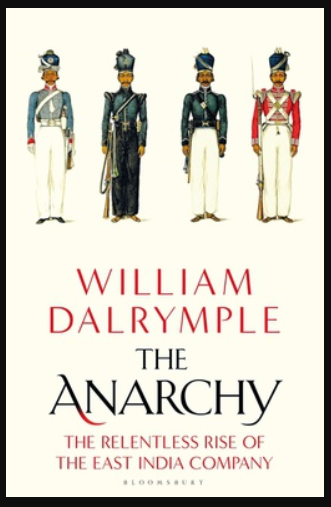
And regarding that story about Benedict Cumberbatch and the dark side of wealth accumulation through history.
One of the best books I've read in this space is The Anarchy (2019), by the historian William Dalrymple.
It's about the history of the British East India Company.
It tells how the for-profit company, with backing of the British parliament, by 1803 had raised a private army of 200,000 men - twice the size of the British army - and "subdued" or directly seized an entire subcontinent.
As Dalrymple tells it:
"We still talk about the British conquering India, but that phrase disguises a more sinister reality. It was not the British government that began seizing great chunks of India in the mid-eighteenth century, buy a dangerously unregulated private company headquartered in one small office, five windows wide, in London.
"Historians propose many reasons for the astonishing success of the Company: the fracturing of Mughal India into tiny, competing states; the military edge that Frederick the Great's military innovations had given the European Companies; and particularly the innovations in European governance, taxation and banking that allowed the Company to raise vast sums of ready money at a moment's notice.
"Yet perhaps the most crucial factor of all was the support that the East India Company enjoyed from the British parliament ... Parliament backed the company with state power: the ships and soldiers that were needed when the French and British East India Companies trained their guns on each other."

Dalrymple says the East India Company also probably invented corporate lobbying.
"In 1693, less than a century after its foundation, the EIC was discovered for the first time to be using its own shares for buying parliamentarians, annually shelling out £1,200 a year to prominent MPs and ministers.
"The parliamentary investigation into this, the world's first corporate lobbying scandal, found the EIC guilty of bribery and insider trading."
He says the company stripped India of so much wealth to send back to England that it changed the course of history.
And it had an influence on the American War of Independence.
"Before long the EIC was straddling the globe. Almost single-handedly it reversed the balance of trade, which from Roman times on had led to a continual drain of Western bullion eastwards. The EIC ferried opium east to China, and in due course fought the Opium Wars in order to seize an offshore base at Hong Kong and safeguard its profitable monopoly in narcotics.
"To the West it shipped Chinese tea to Massachusetts, where its dumping in Boston harbour triggered the American War of Independence. Indeed, one of the principal fears of the American Patriots in the run-up to the war was that Parliament would unleash the East India Company in the Americas to loot there as it had done in India.
"In November 1773, the Patriot John Dickinson described EIC tea as 'accursed trash,' and compared the potential future regime of the East India Company in America to being 'devoured by Rats'.
"This 'almost bankrupt company', he said, having been occupied in wreaking 'the most unparalleled Barbarities, Extortions and Monopolies' in Bengal, had now 'cast their Eyes on America, as a new theatre, whereon to exercise their Talents of Rapine, Oppression and Cruelty'."
That private company with a handful of directors and a small office in London ended up ruling over a population of 50 to 60 million people in India.
One of its directors even admitted that the EIC was "an empire within an empire" with the power to make war or peace anywhere in the East. The company came close to generating half of Britain's trade at one point.
It's a brilliant book. A genuine page-turner.









 Add Category
Add Category